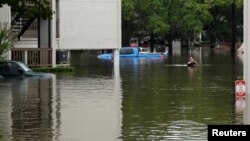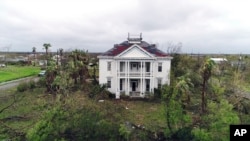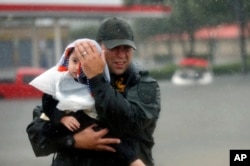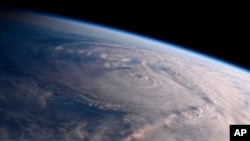Heavy rain continued to pour Tuesday on southeastern Texas where Tropical Storm Harvey has already caused catastrophic flooding in one of the largest cities in the United States.
The National Weather Service expected the storm to drop 25 to 50 centimeters of rain before it finally moved out of the region Thursday. That is in addition to upwards of 90 centimeters of rain that has already fallen in some areas, including around the city of Houston.
Harvey's center was sitting just off the Texas coast in the Gulf of Mexico, drawing energy from the warm waters there and pushing band after band of heavy rain onshore. The storm is expected to make landfall in Texas again on Wednesday.
WATCH: Victims of flooding rescued
The water has flooded homes and roads and left rescuers working continuously to get people to safety.
Houston Mayor Sylvester Turner said as of Monday evening more than 3,000 people had been rescued and 8,000 people were in shelters. He said there were three confirmed deaths related to the storm.
Texas Governor Greg Abbott told reporters he deployed the entire 15,000-member Texas National Guard to help deal with the disaster.
Abbott praised local leaders along the Texas Gulf coast, calling them "humane, courageous, and heroic." He said the way people got through the storm and that so many lives were saved is "remarkable."
Trump to visit Corpus Christi, Austin
President Donald Trump and his wife, Melania, are traveling Tuesday to the cities of Corpus Christi and Austin to receive briefings from local and state leaders and to tour an emergency operations center.
Trump said Monday the people in flood-hit areas of Texas and neighboring Louisiana can expect "very rapid action" from Congress to get the disaster relief funding they will need to clean up and rebuild.
"You're going to have what you need and it's going to go fast," the president said.
Trump has already declared 18 counties in Texas and Louisiana as disaster areas, making them eligible for federal help. Texas Governor Abbott has made a similar designation for 54 counties to speed state aid.
Overall damage from the storm is expected to be in the tens of billions of dollars.
Trump said 8,000 federal workers are on the ground in Texas, including many with the Federal Emergency Management Agency (FEMA).
FEMA plans a long stay
FEMA chief Brock Long told a Monday news conference the agency is going to be in Texas "for several years."
"We're anticipating over 30,000 people being placed in shelters temporarily — to basically stabilize the situation and provide for their care. Next — we are ready — and already deploying life-essential commodities."
Long said FEMA is bracing for one of the longest periods of housing recovery ever seen.
"While the hurricane-force winds have diminished — I want to stress that we are not out of the woods yet," said acting U.S. Homeland Security chief Elaine Duke. "Not by a long shot. Harvey is still a dangerous and historic storm."
Duke said rivers in south Texas "won't crest until later this week."
Louisiana Governor John Bel Edwards said, "The storm is more or less stationary, but to the extent that it's moving, it's actually moving towards the east in our direction and that makes this obviously a dangerous situation for our state."
'Catastrophic for days to come'
U.S. Weather Prediction Center lead forecaster Patrick Burke told VOA: "We've never seen a storm like this. We've never seen these rainfall amounts over such a large area, and so the damage is already catastrophic and unfortunately is going to continue to be catastrophic for days to come."
Harvey was the strongest hurricane to hit the United States mainland in more than a decade.










